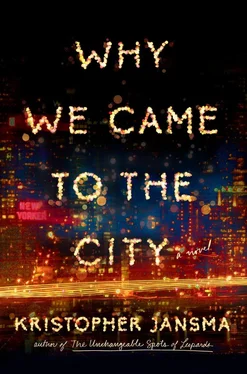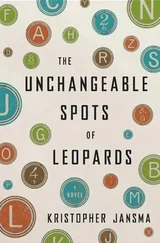William wanted to argue, but she slumped into his shoulder.
He could feel her body tensing as she tried not to cry. Fortunately Skeevo was too busy dodging traffic to notice a tear leaking out from under her eye patch. William wiped it away. Then he caught the one falling from her good eye and wiped that one away too.
Infertility, Dr. Zarrani had said, was a likely long-term side effect of the chemo. So was ototoxicity (a sensitivity to high-pitched sounds), neuropathy (numbing of the fingers), heart damage, and most ironic of all, greater susceptibility to cancer in the future. Irene didn’t seem to care about anything except losing the ability to have a child.
“How do you feel about adoption, William?” she asked. “I’ve always wanted to adopt a baby. I’m basically adopted myself, you know.”
“I’m for it,” William said. The video ended with Skeevo’s son chewing merrily on his mother’s hair. “That’d really drive my mother off the wall.”
Irene sighed. “She’s so sweet. You should be nicer to her.”
William turned away and looked out the window at the dingy Brooklyn boulevard they were heading down. He took in a deep lungful of fresh air. It was difficult, but he needed to be ordinary again for a while. He needed to feel how he felt, late at night, while he lay awake next to her in bed, unable to sleep. In those dark hours with his eyes shut, he had been counting disappointments on a hundred imaginary fingers. Not things that he was disappointed by but disappointments of his own making. Things like having made more money than he deserved, doing mergers for companies with questionable ethics, being a terrible son — anything he felt the universe might be punishing him for by making the woman that he loved so sick.
He knew it was egotistical to believe it was somehow his fault, but this made more sense than trying to imagine it was her fault. All she ever did was turn ordinary things unordinary. Lying next to her, at home on the bed, or there on the truck seat, with her hair smelling burned and her arms feeling thin, with her skin red and her eye mutilated, he couldn’t bring himself to imagine what she could’ve done to deserve this.
AUGUST
The steps of the Metropolitan Museum of Art burned through the seat of Jacob’s pants as he stared out at Fifth Avenue, waiting for Irene. He’d arrived early and was annoyed because he didn’t know exactly how early he was. He had given up wearing watches, and when his phone display broke, he’d refused to get a new one, because technically it still made calls — if he could remember the number to dial. Text messages were a lost cause, of course.
He had been wanting to call Irene all morning to insist that they bag this whole thing, but the only person’s number he could ever remember was George’s, and George had grown tired of Jacob calling him every ten minutes, asking him to look up someone else’s number. It didn’t matter. Jacob knew Irene would have insisted anyway. If he’d canceled on her, she’d have come by herself, just to prove she could.
It was their tradition to get dressed up and go to a museum on the second Sunday of every month. They had only missed one before, during a hurricane — but for God’s sake, she was supposed to be taking it easy, not going around in hundred-degree heat, and not spending all week at the gallery learning to arc weld. How was she supposed to operate a blowtorch when she had trouble lifting her purse? One of these days she was going to set herself on fire.
Whatever admiration he’d felt back in July for her dedication and energy was now, in August, a distant hallucination. Now he just wished she’d ease up. Allegedly July’s treatments had been much harsher than the previous rounds— allegedly , of course, because Jacob hadn’t been informed about the previous round — but the others had filled him in on the pattern: she’d feel queasy during the days of treatment but not totally awful. And then, just when the inconvenience of the hospital visits was over and she began fantasizing about getting her life back, the aggregated chemo drugs and radiation side effects would hit all at once. She looked airless half the time, as if instead of putting something into her, they were siphoning something out.
Jacob peered over the shoulder of a man on the step below him and saw on his phone that it was 12:19, which meant Irene was a little late — they’d agreed to meet at 12:15. The man was reading a story on Gawker about some handsome actor that Jacob recognized but couldn’t remember the name of, who had tried, and failed, to kill himself. The man kept looking up and making audible, dramatic gasping sounds, as if to make sure everyone nearby knew that he was shocked .
Several steps down from him were three orderly rows of squatting grade-school children, their teachers lazily circling them, looking up the avenue for their school bus. The rows of schoolkids began to get restless with the barber shop quartet busking on the corner, singing old standards like “I Got a Gal in Kalamazoo” and “You Make Me Feel So Young.” At some point the teachers responded. “Let’s do our song, kids. Come on!” Jacob eased back, curious if they’d be singing a little “Fr è re Jacques” or “The Farmer in the Dell”—but no, as he listened through the din of high-pitched voices, he could tell it wasn’t any of those childhood classics. “‘Baby, baby, baby, oh!’” the kids sang, “‘Baby, baby, baby, oh…’” Jacob saw to his horror that the teachers were actually encouraging this atrocity — recording it on their cell phones. Surely it would be on YouTube before their bus arrived. Jacob thought he’d never live to see the day he missed Barney the Purple Dinosaur, but now here he was.
He was sore from the steps and could feel sweat over every inch of him. People rudely trampled by just inches from his spot, though there was plenty of room to go around. He couldn’t stop wiping at his forehead and knew it was turning all red. Then, just when he thought he might actually implode from unexpressed venom, there around the corner, past the hot dog vendors, he saw Irene coming at last. She wore a long, flowing white dress, and her hair was pulled up in an elegant twist that hid how thin it had become after all the treatments. She was fully made up, as she usually was now that the eye patch had come off. She’d figured out how to cover the scars with foundation and eye shadow. She’d put on a bit of blush. Her cheeks, like the rest of her these days, were colorless.
“You look like a million bucks,” he said eerily.
“Why didn’t you wait for me inside? You look like hell.”
• • •
They went up the steps and through the revolving doors into the crowded Great Hall. Irene tilted her head back to stare up at the vaulted ceiling, and Jacob noticed her lurch back. He moved quickly, as if to catch her, but she righted herself without a word. They got in line.
“One student,” Jacob said, flashing his faded college ID.
“You need to get a sticker to show you’re still enrolled,” the old man said.
“Sticker?” Jacob feigned ignorance. “What are you talking about?”
Normally they went through a round or two of this, but Irene stepped in before it could escalate. “Twenty-five dollars is only a suggested price. Just say you want to pay twelve.”
“They’ll think I’m cheap!”
“You are cheap.”
The old man began his spiel. “Sir, every dollar you spend goes directly to the museum’s collection, which is unparalleled in the country in terms of its variety and excellent—”
“Where are the dinosaurs?” Jacob asked, peering around as he pushed his ten and two singles across the counter.
Читать дальше












